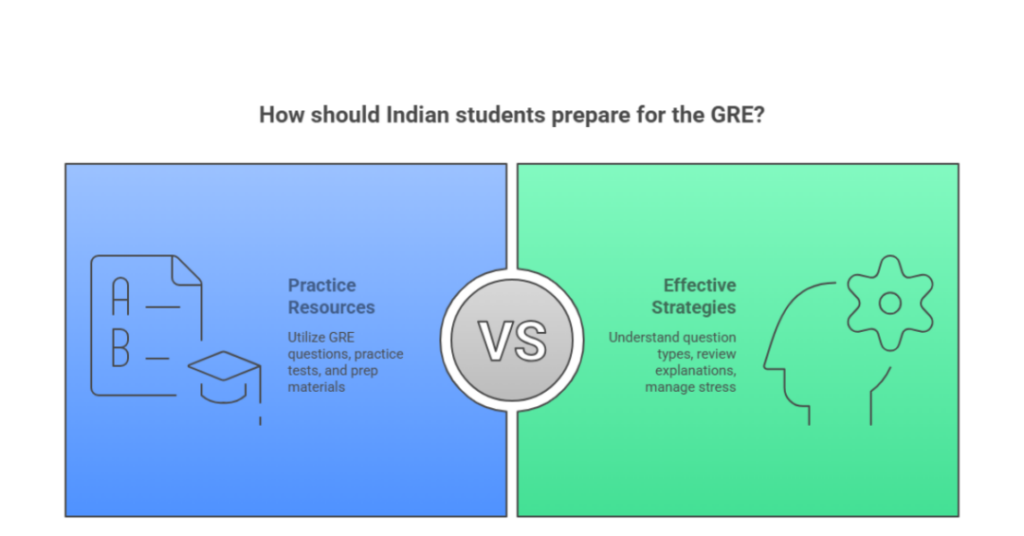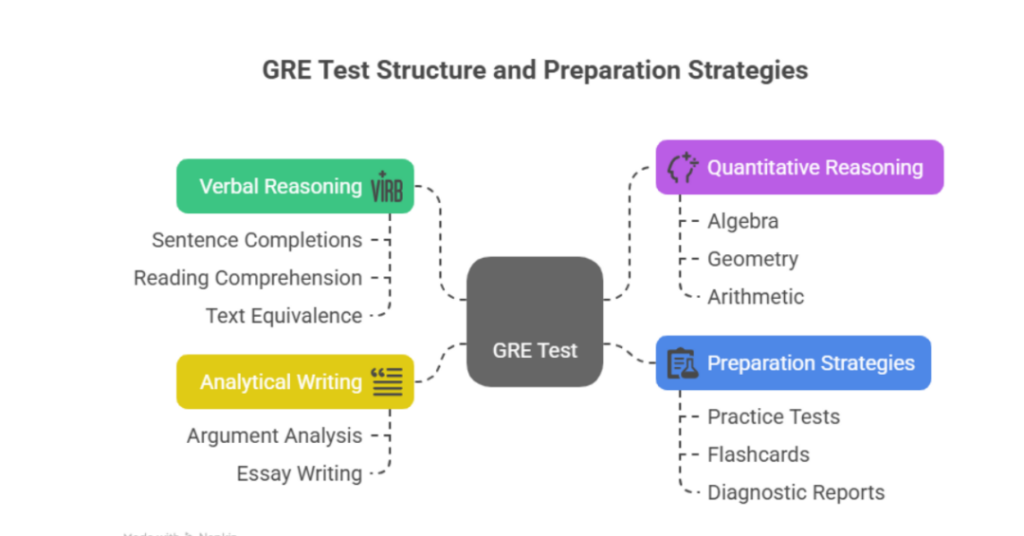23 May 2025
7 minutes read
Top GRE Questions Indian Students Must Know Before Test Day

Key Takeaways
- Practice regularly with full-length GRE practice tests to improve time management and confidence for test day.
- Focus on understanding key concepts in both verbal and quantitative sections to tackle different question types effectively.
- Review every mistake and learn from it to continuously improve your GRE score and achieve your target.
Over 90% of Indian students struggle with GRE questions, not because they’re not smart, but because they prepare wrong. They cram words, skip understanding concepts, and panic on test day. The truth? You don’t need to answer every question; you need to answer the right ones well.
If you’re serious about getting into the graduate schools of your choice, stop guessing and start practicing with real GRE questions. This guide gives Indian students what they actually need to score higher.
What is the GRE and Why Do Indian Students Take It?
The GRE, or Graduate Record Examination, is a standardized test accepted by thousands of graduate schools worldwide. For Indian students, it’s a gateway to top universities in the U.S., Canada, and more. The GRE exam benefits your verbal reasoning, quantitative reasoning, and GRE analytical writing skills.

To score higher, you must practice regularly using GRE questions, free GRE practice tests, and official GRE prep materials. Understanding each question type, reviewing answer explanations, and managing test day stress are crucial. Use ETS resources, Kaplan, and PowerPrep tools for realistic practice questions and a clearer path to the graduate schools of your choice.
Types of GRE Questions Indian Students Will Encounter
The GRE General Test contains three core sections: Verbal Reasoning, Quantitative Reasoning, and Analytical Writing. Each tests a different skill set, and mastering all is essential to get a GRE minimum score.
In the Verbal Reasoning section, expect sentence completions, reading comprehension, and text equivalence. The answer choices can be tricky, so it’s important to review sample questions and understand the logic behind each right answer.

The GRE Quantitative Reasoning section tests high-school-level math: algebra, geometry, and arithmetic concepts like integers, arithmetic mean, and ratios. Practicing free GRE question papers and using flashcards regularly will help you handle varying difficulty levels confidently.
Analytical Writing includes two essays where you must logically present and critique arguments. A strong GRE practice question routine and understanding the format of each question type will help you feel more prepared for the exam.
To succeed, Indian students must take the GRE with a solid study plan, including full-length practice tests, and review diagnostic reports from tools like PowerPrep practice tests by the Educational Testing Service (ETS). Understanding what you’ll see on test day is half the battle.
GRE Verbal Questions: Tips for Indian Test-Takers
GRE Verbal Questions: Tips for Indian Test-Takers
Many Indian students find Verbal Reasoning on the GRE test more intimidating than math. That’s because it’s not about grammar—it’s about logic, vocabulary, and comprehension. Let’s break it down.
10 GRE Sample Verbal Questions with Answers
- The professor’s explanation was so ______ that even students with no background in the subject could understand the concept.
A. recondite
B. lucid
C. abstruse
D. enigmatic
Answer: B. lucid - Despite its ______ beginnings, the company became a global powerhouse.
A. ostentatious
B. meager
C. lavish
D. sudden
Answer: B. meager - Although the CEO is known for her public warmth, she can be surprisingly ______ in private meetings.
A. affable
B. reticent
C. gregarious
D. effusive
Answer: B. reticent - The two scientists’ theories were not merely different, but diametrically ______.
A. opposed
B. aligned
C. similar
D. unrelated
Answer: A. opposed - The author’s argument was weakened by her failure to address the most obvious ______.
A. solution
B. benefit
C. counterpoint
D. agreement
Answer: C. counterpoint - Select the two answer choices that fit the sentence:
The manager was so ______ that she noticed the missing semicolon in a 10-page report.
A. meticulous
B. indifferent
C. perceptive
D. negligent
Answer: A. meticulous, C. perceptive - Which word best completes the sentence?
The politician’s speech was so full of ______ that listeners were unsure of her true position.
A. candor
B. equivocation
C. passion
D. certainty
Answer: B. equivocation - Which sentence uses the word “precipitate” correctly?
A. She tried to precipitate the deadline to next year.
B. His rash decision helped precipitate the crisis.
Answer: B - In context, “opaque” most nearly means:
A. transparent
B. unclear
C. thin
D. luminous
Answer: B. unclear - The word “innovative” is closest in meaning to:
A. derivative
B. pioneering
C. regressive
D. cautious
Answer: B. pioneering
5 Verbal Prep Tips for Indian Students
- Read daily from diverse sources – Use The Economist, Scientific American, or NYT. It builds vocabulary and sharpens logic for real GRE test day questions.
- Don’t memorize—contextualize GRE idioms and words – Understanding usage is more valuable than rote learning 1000-word lists.
- Practice with a timer – GRE is not just about knowing the right answer, but answering all questions efficiently within time.
- Review your mistakes – Every time you choose the wrong answer, dig into why it was incorrect. This reflection improves your thorough understanding.
- Use official and free GRE practice questions – Stick to ETS, PowerPrep, and unaffiliated high-quality sources to match the level of difficulty you’ll see on screen.
GRE Quant Questions: Where Indian Students Struggle Most
Despite strong math foundations, many Indian students find GRE Quantitative Reasoning unexpectedly tricky. Why?
Because it’s not just about solving, about thinking logically under pressure and spotting traps in the question format.
10 GRE Quant Practice Questions with Answers
- What is the value of 25% of 80?
A. 15
B. 20
C. 25
D. 30
Answer: B. 20 - If 2x – 3 = 11, what is the value of x?
A. 6
B. 7
C. 8
D. 9
Answer: A. 7 - Which of the following is NOT a prime number?
A. 2
B. 11
C. 17
D. 21
Answer: D. 21 - The average (arithmetic mean) of five consecutive even numbers is 20. What is the smallest of these numbers?
A. 14
B. 16
C. 18
D. 20
Answer: B. 16 - A shopkeeper sells an item for ₹240, making a profit of 20%. What is the cost price?
A. ₹180
B. ₹190
C. ₹200
D. ₹220
Answer: C. ₹200 - If x = 4 and y = 2, what is the value of (x² + y²)/xy?
A. 2
B. 3
C. 5
D. 6
Answer: D. 6 - A train travels at 60 km/h. How far will it travel in 2.5 hours?
A. 120 km
B. 130 km
C. 150 km
D. 160 km
Answer: C. 150 km - Which number is a multiple of both 3 and 4?
A. 10
B. 12
C. 18
D. 20
Answer: B. 12 - If the perimeter of a square is 48 cm, what is the length of one side?
A. 10 cm
B. 12 cm
C. 14 cm
D. 16 cm
Answer: B. 12 cm - In how many different ways can the letters in the word “QUIZ” be arranged?
A. 4
B. 12
C. 24
D. 36
Answer: C. 24
5 Quant Prep Tips for Indian Students
- Focus on understanding, not speed alone – Many GRE® questions are simple but designed to confuse. Take your time to identify the trap before solving.
- Practice mental math regularly – You’ll face on-screen calculations, and building strength in approximation and fractions saves time during test prep.
- Don’t skip Data Interpretation – These quantitative reasoning measure questions are frequent and need strong reasoning, not just calculation.
- Review incorrect answers thoroughly – Every single selected question you solve wrong tells you what to implement in your study time.
- Use diagnostic quizzes weekly – Tools like PowerPrep or unaffiliated sample GRE platforms help indicate weak areas and improve your score on the GRE.
Analytical Writing: What Indian Students Should Focus On
Analytical Writing on the GRE exam contains two tasks—Issue and Argument—and it often intimidates Indian students because it tests critical thinking, not just writing. But with the right GRE prep, this section can become your strength, not a struggle.
10 Sample Analytical Writing Prompts (With Key Pointers)
Each of these questions is based on actual GRE prep prompts. Use these to prepare for the GRE, especially the Issue and Argument tasks, which the section contains two of.
Issue Task Prompts
- “Government should spend more money on education than on the military.”
Takeaway: Discuss economic priorities, include examples, consider both sides.
Answer Direction: Argue your position with structured reasoning. - “Success is more about who you know than what you know.”
Takeaway: Compare social networking vs. merit.
Answer Direction: Back with real-world or cultural examples from India. - “People who make decisions quickly are often more successful than those who take their time.”
Takeaway: Discuss risk vs. analysis.
Answer Direction: Address both short-term and long-term results. - “Leaders are most effective when they are willing to compromise.”
Takeaway: Evaluate leadership styles.
Answer Direction: Use current events and ethical reasoning. - “Education should be equally focused on arts and sciences.”
Takeaway: Discuss balance in academic curricula.
Answer Direction: Relate to Indian education system reforms.
Argument Task Prompts
- “The city should reduce bus fares to increase public transport usage.”
Takeaway: Question assumptions and demand data.
Answer Direction: Point out missing evidence and alternative causes. - “A recent study found students who study late at night score higher.”
Takeaway: Correlation ≠ causation.
Answer Direction: Discuss sampling and flawed generalizations. - “Company X should invest in remote work to boost productivity.”
Takeaway: Challenge the logic.
Answer Direction: Identify variables and unexamined assumptions. - “Because last year’s festival had high turnout, we should repeat the same format.”
Takeaway: Repetition doesn’t guarantee success.
Answer Direction: Ask if external factors played a role. - “Our school should eliminate physical education to improve academic scores.”
Takeaway: Consider holistic education.
Answer Direction: Use studies, logic, and counter-arguments.
5 Writing Tips for Indian Students
- Practice writing on a regular basis – Use free practice questions, GRE forums, or your own question of the day system to stay sharp.
- Understand what makes sense – Many students score low because they overcomplicate or write incorrectly. Simplicity + structure = high score.
- Keep in mind the scoring rubrics – You must also address logic, clarity, and relevance. Use proper paragraphing and transitions.
- Allocate GRE preparation time wisely – This section doesn’t need memorization of GRE idioms, but it would need logical reasoning, quick outlining, and counterpoint-building skills.
- Get used to writing in the GRE’s on-screen interface – You won’t have spell-check or formatting options, so prepare for the GRE pen and paper test or digital conditions with a timer.
Conclusion
Mastering GRE questions, from verbal reasoning and quantitative reasoning to the nuanced reasoning and quantitative reasoning sections, is essential for Indian students ready to conquer test day. If you find yourself staring at a blank screen or considering a retake, remember each attempt is just another round to get better.
To truly make one stand out, you need strategic prep tailored to your strengths and goals. That’s where Ambitio steps in.
With expert profile building and personalized guidance, Ambitio ensures you’re not just ready for the GRE, but ready to unlock your dream university’s door. Join Ambitio and transform your study abroad journey!
FAQs
How many full-length practice tests should I take before the GRE?
It’s recommended to take at least 3-5 full-length practice tests to get familiar with the test format, improve time management, and track progress.
Should I prioritize verbal or quantitative reasoning in my GRE prep?
It depends on your target program. If your field is more math-focused, emphasize Quantitative Reasoning, but balanced preparation is crucial since both sections contribute to your overall score.
How should I approach the Analytical Writing section?
Focus on crafting clear, logical arguments, using real-world examples where possible. Review sample essays from ETS to understand what high-scoring responses look like.
Can reviewing wrong answers really improve my score?
Yes! Identifying patterns in your mistakes helps you understand weak areas and refine your approach to similar questions in the future.
What’s the best way to build GRE vocabulary?
Using flashcards with GRE-specific words and reading high-level texts (e.g., academic articles) will help you build a strong vocabulary for the Verbal Reasoning section.
How important is pacing during the GRE?
Pacing is critical—practicing under timed conditions helps you avoid spending too much time on any one question, which can cause you to miss out on easier questions later.
Should I retake the GRE if I’m not satisfied with my score?
If your score is significantly below the requirements of your target schools, it may be worth retaking after focused study to boost your performance.

You can study at top universities worldwide!
Get expert tips and tricks to get into top universities with a free expert session.
Book Your Free 30-Minute Session Now! Book a call now




























